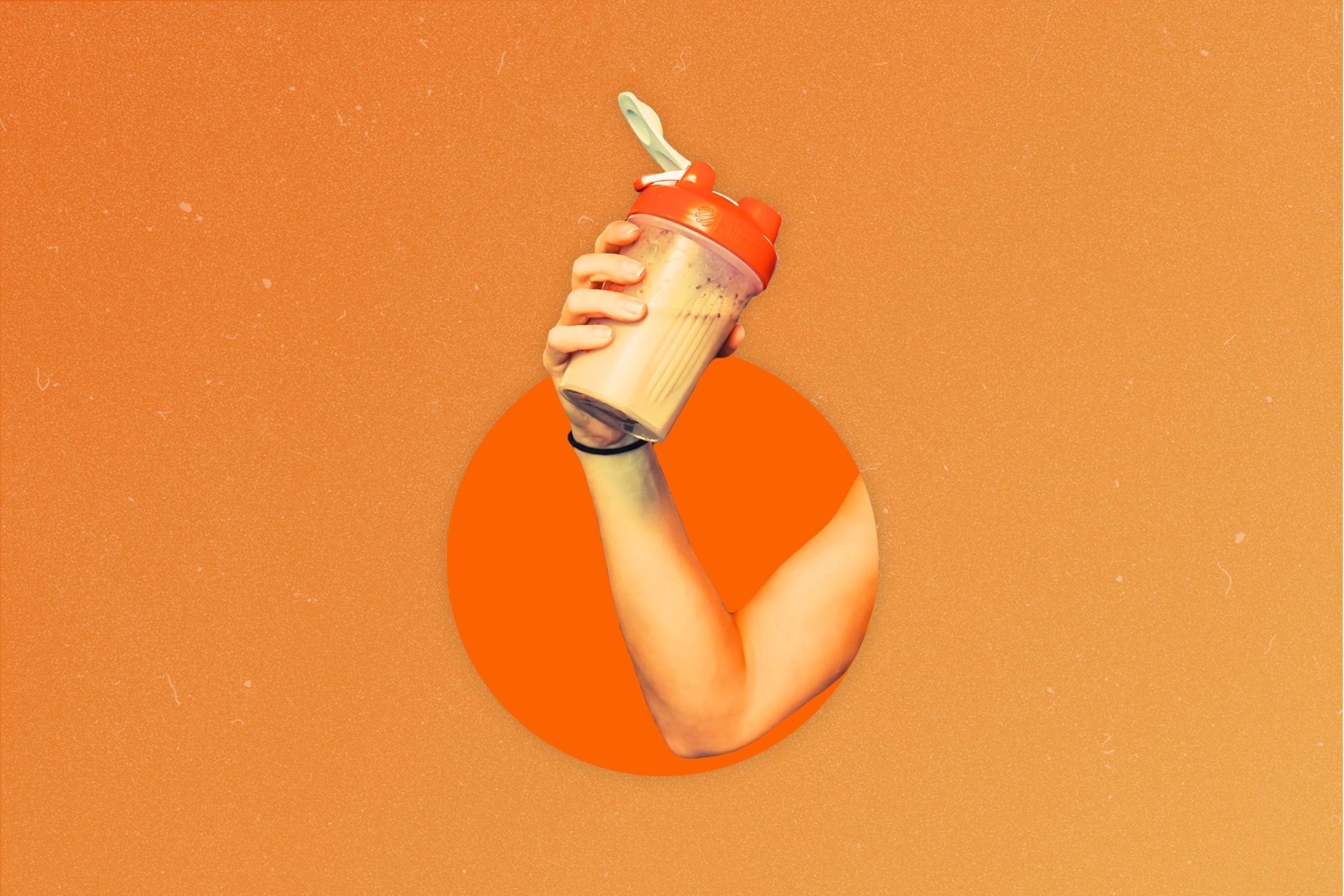Are Muscle-Building Supplements a Good Idea?

Want to put on muscle? Who wouldn’t: It keeps you strong enough to do the things you love now, and it’s a great investment for later, since muscle improves bone mineral density and mobility as you age. People with more muscle mass have better outcomes when they’re sick, and quicker recoveries.
It’s hard not to be tempted by the powders, protein bars, and shakes promising to help. Whey, creatine, and branched-chain amino acids (BCAAs) are among the most popular of these. But what do they actually do, and who (if anyone) should take them?
[time-brightcove not-tgx=”true”]
Start with exercise
The first thing to know about muscle-building supplements is that they should not be your top priority. Resistance-training workouts should. These challenge your muscles, which is how to grow them.
“[You need] a stimulus greater than you’re used to…a load you aren’t used to carrying,” says Abbie Smith-Ryan, director of the applied physiology lab at the University of North Carolina at Chapel Hill. Most of us could stand to do more of it: only about a third of Americans do the recommended amount of muscle-strengthening exercise, according to the latest federal data.
For people who already do strength training, challenging your muscles might look like lifting heavier weights, shortening rest periods, or increasing the number of reps. The key is to “push your muscles to the edge,” says Elisabeth Barton, a muscle physiologist at the University of Florida. “Go to your limits.” This resistance challenge causes slight damage to your muscle, triggering a process called “regeneration,” in which cells activate and help grow new muscle fibers. As they repair the muscle, these cells multiply and fuse, increasing the overall size of the muscle. Resistance exercise also stimulates a cascade of growth signals that prompt muscle fibers to reinforce themselves, capillaries to expand the muscle’s blood supply, and DNA to make more proteins.
Read More: Why Walking Isn’t Enough When it Comes to Exercise
As long as you’re getting enough calories, this process works to increase your muscles. However, if you’re underfueling yourself, these muscle-challenging workouts can actually lead to muscle loss. When your body is forced to choose between growing your muscles and, say, feeding your brain, bigger muscles will always take the backseat. But for most people, the limiting factor for muscle growth is their workout, not a lack of nutrition, Smith-Ryan says.
Assess your diet
Foods can help you increase muscle mass, says Smith-Ryan. People who are exercising need between 1.4 to 2 grams of protein per kilogram of bodyweight each day (that’s 95 to 136 grams of protein for a person weighing 150 pounds). The majority of that will come from protein-rich foods like chicken breast, turkey, Greek yogurt, milk, and chickpeas.
However, “it is difficult to get enough macronutrients and the calories we need from whole foods,” since they can be time-consuming to prepare, Smith-Ryan says. “You are what you eat consistently.” And if a supplement helps you fuel your body consistently while you live your life, it might be a good option.
Whey
Whey can make up for some of what we miss in our diets. It’s considered a high-quality protein because it is absorbed quickly into the bloodstream and contains all nine essential amino acids—so named because the body doesn’t make them, so they must be consumed. (People can get all of the essential amino acids through a well-rounded diet.) It’s useful to have plenty of amino acids on hand—a kind of reservoir—when you train to support the regeneration process, Barton says.
Read More: Magnesium Supplements Are a Buzzy New Sleep and Anxiety Aid. Do They Work?
Using a whey product also boosts your protein without a lot of calories in the form of carbs and fats, Smith-Ryan says. Whey is fast and easy to eat on the go in the form of a smoothie or shake, making it a good option for busy people trying to get enough macronutrients. It might also be useful for people struggling to eat within the recommended window around a workout—15 to 60 minutes prior or 30 to 60 minutes after, Smith-Ryan says. Before or after a tough workout, a shake might be more appetizing than a chicken breast.
Creatine
Creatine doesn’t directly influence muscle growth, but it may still offer a little help. In the body, creatine is formed from amino acids and replenishes phosphocreatine, an important energy source for muscle cells.
“What it does benefit is the length of time you can train,” Barton says. Consuming it before a workout can help you train just a bit longer and eke out a few more reps. Since stimulus is the number-one muscle grower, creatine may help you put in more effective training sessions.
If you’re eating animal protein, you’re already making creatine. A teaspoon of the supplement creatine monohydrate contains the same amount of creatine as one pound of ground beef, Smith-Ryan says.
Vegetarians may have an even better response to creatine supplementation than omnivores since they tend to have lower creatine levels. One clinical trial found that vegetarians taking creatine showed a bigger increase in creatine stores, lean tissue, and exercise performance compared to non-vegetarians who took creatine.
However, if you don’t have a resistance training regimen just yet, creatine isn’t for you. “It doesn’t do anything for muscles without the added exercise,” Barton says.
Similarly, if you’re just starting out an exercise regimen, pass on creatine. This supplement is most useful for people who are already training consistently and looking for incremental improvement. If that’s not you, stick to the basics. Challenging workouts and proper fueling will be your best muscle builders.
BCAAs
BCAAs contain three essential amino acids: leucine, isoleucine, and valine. Unlike the other six essential amino acids, which are broken down in the liver, BCAAs are metabolized in the muscle. “When you see them in higher [amounts] in the blood, it’s a clear indication that muscles are breaking down,” Barton says.
Read More: What the Science Says About the Health Benefits of Vitamins and Supplements
Ads for these supplements suggest that taking them will replenish the muscle and prevent muscle loss, but there isn’t much data to support BCAAs in muscle growth. In fact, a 2017 review of the evidence called these claims “unwarranted.” “Ten years ago, the science seemed to show you needed BCAAs to build muscle, but what science shows now is you really need all the amino acids, not just BCAAS,” Smith-Ryan says.
Today, she recommends against a BCAA supplement. Instead, she advises, take a whey supplement for muscle growth or an essential amino acid (EAA) supplement, which contains all nine amino acids you need to get from food. EAAs are a good option if you don’t respond well to dairy and prefer to avoid whey protein. Some people like the taste of fruity EAA drinks over thicker whey protein shakes, Smith-Ryan says. It comes down to personal tastes.
How to take supplements
If you decide to incorporate supplements into your diet, it’s best to choose a product that’s been tested by a third-party organization like NSF, Banned Substances Control Group, or Informed Sport, Smith-Ryan says. She says that whey, creatine, BCAAs, and EAAs have “minimal cause for concern.” However, that’s not universally true for all supplements (which aren’t regulated by the FDA as strictly as drugs) that promise to boost muscle growth. And taking too much of anything can be problematic.
For instance, consuming large amounts of protein powder can cause digestive problems. This may be caused by a sensitivity to an ingredient in the powder, like dairy, soy, or gluten. It may take a few tries to find the protein powder that works best for you. Symptoms like diarrhea and bloating may also be a result of over-consuming sugar alcohols, a low-calorie sweetener used in many protein powders.
There have been some concerns that creatine causes dehydration, potentially by increasing the water content of muscle cells and thereby increasing the body’s water needs. However, this theory has not been supported in the research literature. Multiple studies have found that creatine actually improves hydration and reduces cramps. Still, multiple creatine brands advise customers to increase their water intake with creatine use. It’s always a good idea to read up on the product and take it as directed, Smith-Ryan says.
If you’re considering multiple supplements, remember that whey and EAA powders do the same thing, so you’ll only need one. But both can be safely taken alongside creatine, according to Smith-Ryan.
View original article
Contributor: Donavyn Coffey

